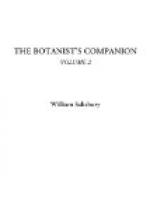155. VISCUM album. Misselto.—A parasitical plant well known, and formerly of much repute in medicine, but wholly disregarded in the present practice. Birdlime is made from the berries.
Dr. Pulteney in tracing the history of Botanic science quotes Pliny for an account of the veneration in which this plant was held by the Druids, who attributed almost divine efficacy to it, and ordained the collecting it with rites and ceremonies not short of the religious strictness which was countenanced by the superstition of the age. It was cut with a golden knife, and when the moon was six days old gathered by the priest, who was clothed with white for the occasion, and the plant received on a white napkin, and two white bulls sacrificed. Thus consecrated, Misselto was held to be an antidote to poison, and prevented sterility. Query, Has not the custom of hanging up Misselto at merry-makings, and the ceremony so well known among our belles, some relation to above sacrifice?
156. ULEX europaeus. Common furze.—The culture of this shrub is given in the Agricultural Plants, being good for feeding cattle; its principal use however is for fuel, and it is frequently grown for such purposes. It is common on most of our waste lands. It also forms good fences, but should always be kept short and young, otherwise it becomes thin, especially in good land where it grows up and makes large bushes.
157. Ulmus campestris. The Elm.—We have a number of varieties of the Elm; the most esteemed is that with the smooth bark. The timber has been long in request for water-pipes, and for boards, which are converted into various uses in domestic oeconomy.
158. Ulmus montana. Broad-leaved Elm.—This has not been considered of so great value as the common sort, but it is of much more free growth; and I have been informed that in the West of England the timber has been found to be good and lasting.
* * * * *
SECT. VII.—PLANTS USEFUL IN MEDICINE.
The initial letters in this class distinguish the Pharmacopoeia in which each plant is inserted.
“By the wise and unchangeable laws of Nature established by a Being infinitely good and infinitely powerful,—not only man, the lord of the creation, ‘fair form who wears sweet smiles, and looks erect on heaven,’ but every subordinate being becomes subject to decay and death: pain and disease, the inheritance of mortality, usually accelerate his dissolution. To combat these, to alleviate when it has not the power to avert, Medicine, honoured art! comes to our assistance.




